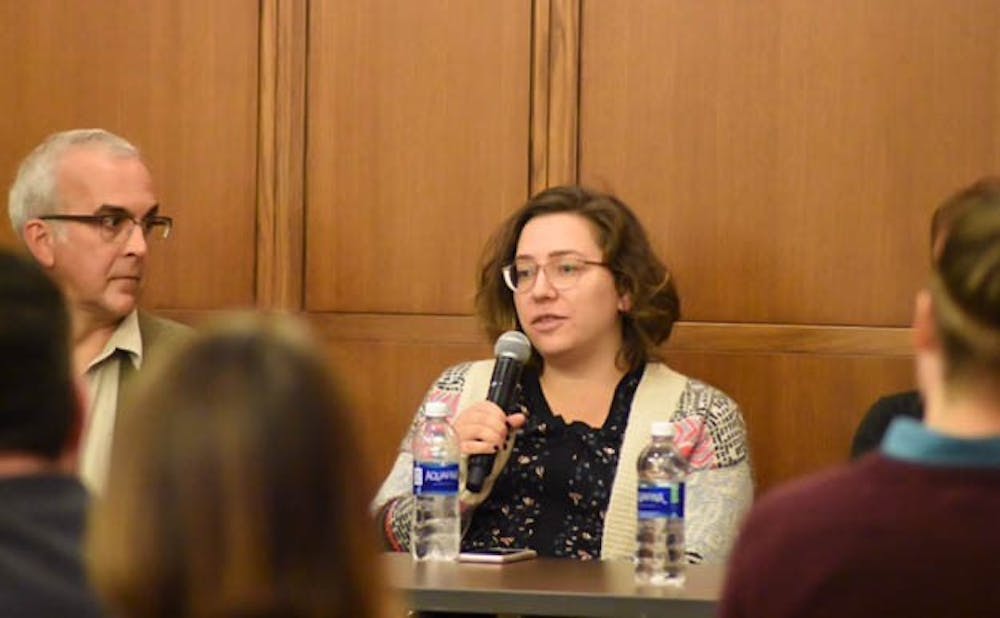Reflecting on the development of Duke’s online education in the past five years, staff and faculty members predicted that online education will continue to connect Duke to a broader and more diverse international community in the coming years.
Duke began to work with Coursera, an education-tech company, in 2012 to launch a series of Massive Open Online Courses, or MOOCs. The Center for Instructional Technology hosted a panel discussion on Wednesday about the progress and prospects of Duke’s online education to celebrate the fifth anniversary of this partnership.
“It is a privilege to share what we do for our internal audience with the rest of the world,” said Leonard White, associate professor of neurology and Coursera instructor, who spoke at the panel.
White noted that he is grateful that the medical neuroscience course he teaches on Coursera has generated profound impacts on its students. For example, a soldier in the Syrian army told White that he used the knowledge from White’s course to save his own life. Another student, a paralyzed learner who could only blink his eyes, accomplished the entire course with a specialized program.
“[Teaching a MOOC] has been the most rewarding experience during my 25 years at Duke,” White said. “Yet our own campus does not seem to be appreciating the value of this undertaking.”
The main advantage of online education is its broad availability, said Jennifer Chambers—Trinity '01, panelist and senior director of alumni education of Duke Alumni Association. She added that international learners with diverse backgrounds can all take advantage of this resource.
Duke Alumni Association in particular operates an online learning program for alumni who intend to seek knowledge in any specific field.
Through this program, alumni are able to achieve skills for their professions that were not needed when they first got the degree years or even decades ago, Chambers said. For example, an alumnus who started a career in marketing 15 years ago may now need skills such as coding and graphic design to pursue their career.
“The online education platform at Duke has helped alumni who want to stay in the same industry while the industry is changing faster than they can get a master degree or Ph.D.,” she said. “[MOOC] offers a short, quick and effective solution to their problem.”
An online educational system that attempts to address numerous international learners also poses various challenges, said Michael Zychowicz, panelist and director of the master of science in nursing program. Many classes under this MSN program are online-based.
Duke's MSN program aims to equip participants with both theories and clinical skills, Zychowicz noted. International students could choose to receive at least six clinical trainings either at Duke or in their home countries. Students need to travel six times during the program or Duke will send a faculty member to evaluate the training program in that country. Either method induces extreme burdens and costs, he added.
Panelists also responded to a Chronicle editorial entitled Rethinking MOOCs, which claims university instructors may hesitate to teach MOOCs because they “have no such altruistic motives to equalize education” as MOOC providers do. It also noted that elite universities have little incentive to invest resources in online learning.
Teaching online courses is not profitable but this experience has benefited instructors in other ways, said panelist Mine Cetinkaya-Rundel—director of undergraduate studies for statistical science and Coursera instructor.
Cetinkaya-Rundel said she learned how to organize team-based learning by engaging with a significant number of learners with unequal background knowledge. She later introduced the techniques back to her class at Duke.
MOOCs are open to numerous learners and teaching a MOOC requires the instructor to be clear with the rubrics and organized with the material, said panelist Pedro Lasch, associate research professor in the department of art, art history and visual studies and Coursera instructor.
“Teaching online courses has made me a better teacher in [a normal classroom setting],” Lasch said.
Cetinkaya-Rundel added that teaching MOOCs is time-consuming and also does not add much to the teaching evaluation of tenure-track faculty members. She acknowledged that more instructors on campus would be willing to teach MOOCs if they might gain concrete benefits from it.
“An innovation in online education is impossible unless [instructors] from different tracks on campus are all rewarded properly,” Cetinkaya-Rundel said.
Looking to the future, Duke has recently launched a new organization called Duke Learning Innovation, combining the Center for Instructional Technology and Online Duke, said Matthew Rascoff, associate vice provost for digital education and innovation, who moderated the discussion. The organization aims to explore new online educational opportunities, especially for on-campus students.
Through this program, Duke students may be able to access Duke MOOCs with their NetIDs and earn academic credits by taking online courses in the near future, Rascoff said. He hopes this program will encourage the student community to engage more in Duke’s online education.
Get The Chronicle straight to your inbox
Signup for our weekly newsletter. Cancel at any time.

